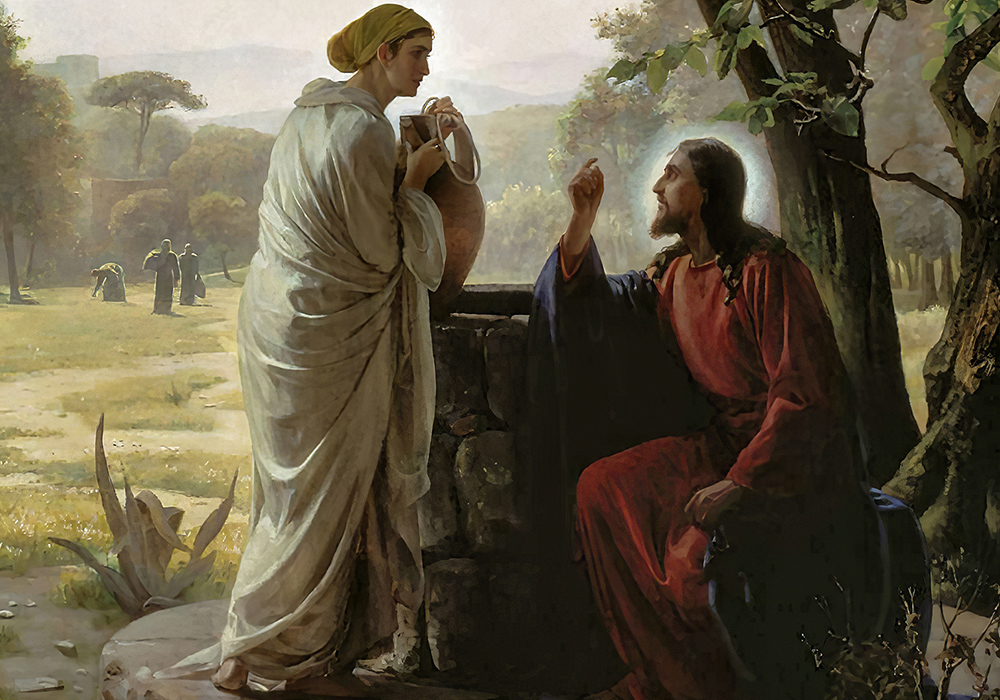
"Woman at the Well" by Danish painter Carl Bloch (Artvee)
Today's Liturgy of the Word starts us out with the Israelites and Moses in the desert. After accepting God's invitation to abandon slavery for freedom, the people quickly started complaining: They missed the food the Egyptians let them have, they feared they would die of thirst … and on and on.
Acting as if God had made no plans and was incapable of providing for them, they groused so much that Moses expected a mutiny. (See Numbers 11 where Moses accuses God of being a negligent mother and complains that his task is more than he can handle.) In response, and to show how shortsighted they were, the creator of snow and rain brought water from stone, demonstrating that for God, nothing is impossible. (See Job 38.)
The desert wanderers really did have legitimate cause for worry. Like so many people today, they had no idea where their next meal would come from and clean water had become a luxury they could only remember. When we consider how little time they had spent in freedom, we can appreciate that they were like dependent children, frightened because the situation was entirely out of their control.
Israel's thirst sets up John's account of the woman at the well. Although we rarely note it, a key aspect of this story is that Jesus was the one who was thirsty. This gives us a pretty iconoclastic image of God! We, who usually turn to God for help, are faced with Jesus, the Christ, sitting thirsty by a well without a bucket. Then, along comes a feisty Samaritan woman. The Savior of the world makes a request: "Give me a drink."
Water is a precious commodity in the desert. Sharing water symbolizes hospitality, openness to the stranger and respect for life. In an inside out image of the God who draws water from stone, the vulnerable Jesus must ask for life-giving water and acceptance, and he does it at the well that symbolizes her heritage of faith in the God of Abraham. Once they have begun their conversation, the tables turn again and Jesus reveals that the divine thirst is not for water, but for a life-giving relationship with humanity.
What happened in the interchange between Jesus and Photina (the name the Orthodox give the Samaritan) should have been more threatening to the guardians of Jewish and Samaritan religion than anything else Jesus preached. When Photina tried to pit the Jewish and Samaritan approaches to God against one another, Jesus led her beyond every expression of denominationalism and dependence on ritual. All that mattered to Jesus was that Photina (and by extension all people) would know God as he did; he thirsted for her to be moved by God's own Spirit and to abide in the truth-generating relationships that flow from that.
Advertisement
This is exactly what happened. As Photina began to comprehend what Jesus was saying, her feistiness turned to curiosity and then to faith. As the representative of a people who had sought God through a series of shallow affiliations (five husbands), she found a truth and love worthy of her and was impelled to share it.

(Unsplash/iStrfry , Marcus)
Too often, we focus on Photina's "five husbands," as if this story were about the conversion of a loose woman. That overlooks the astounding theology and universality of this Gospel message. Theologically, this Gospel story reminds us that our creator invites humanity into relationship, but never imposes. This paints a picture of God as both vulnerable and thirsty, ever waiting near some well to offer life to those who can listen, wonder and respond. The universality of today's message comes through Jesus' proclamation that real worship and relationship with God does not depend on place or ritual, but on how the people become vulnerable to the Spirit's action in their lives.
Paul preaches this very same message in the Letter to the Romans when he assures us that our "justification" is based on faith. If we were to put Paul's idea in the context of the interaction between Jesus and the Samaritan woman, we would say that salvation springs from relationship with God; it is never bound by any particular deed, creed or ritual. Salvation happens when we attend to God's thirst and respond with personal hospitality. Once we have been affected by a relationship with God, it automatically begins to flow into all our other relationships, making us not just believers, but almost irresistible evangelizers.
Today, Photina may appear to us in many guises. We will recognize her not by her name, geography or appearance, but rather by her enthusiastic love and the way she invites us to respond to God's thirst and enjoy living water forever. Like her, all we need do is respond. As a result, the world's thirst will begin to be quenched.
